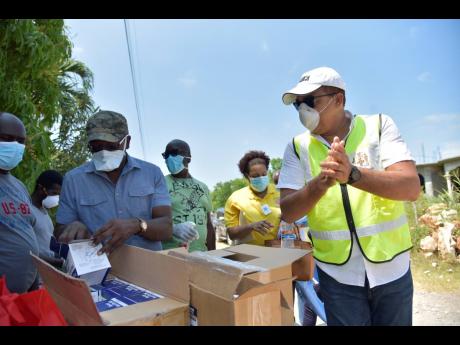Christopher Tufton | Navigating COVID-19 waters: living the new normal
IN JAMAICA, we have begun the slow march to a new normal dictated by the requirements of a COVID-19-managed world – one wherein the actions of everyone counts and for which our population must be prepared.
We are not alone.
Now months into the pandemic, several societies have started the ever-so-gentle pushback against the virus that altered life as we knew it, with more people allowed to venture outdoors and businesses reopening their doors.
Still, public health, certainly in Jamaica, must now be underpinned by three strategic goals:
1. Population protection from harmful health outcomes, which has been the standard;
2. Protective engagement of individuals within the society; and
3. Creation of an environment where citizens can participate in meaningful social activities that enrich their lives and those with whom they interact.
The Ministry of Health and Wellness has begun the buildout of infrastructure that supports the achievement of these goals, with our efforts anchored in International Health Regulation Standards for Public Health Systems and involving developments in eight areas.
These areas include: human resources, legislation and policy; coordination; surveillance; points of entry; laboratory; health system preparedness and response; and risk communication and community engagement.
We have already received approval from the Ministry of Finance and the Public Service for the employment of some 1,300 additional community health aides to augment the existing cadre of approximately 2,300 persons.
The addition of these officers, for which recruitment has started, will enable the Government to sustain our efforts in early detection and to strengthen our capacity to contain and manage any infection, once identified.
This is especially important as the new normal demands active field surveillance using methods such as contact tracing, community education and health information, even as the monitoring of persons in quarantine and isolation are important components of the public health response.
Strengthening of the legal and regulatory framework is also in train. The Cabinet has approved our partnership with the Ministry of Justice to enhance public health laws to ensure better population protection and to secure the rights of individuals even within the context of a crisis.
As part of the ‘everyone counts’ approach, we have begun our engagement with the private sector to ensure that the most appropriate protocols for our return-to-work arrangements can be put in place.
The PSOJ, JMA, JHTA, JCC, and the unions have all come to the table in a spirit of partnership to support the creation of robust protocols that protect the worker and the clients, and ensure overall improvement in productivity.
ECONOMIC ACTIVITY
It is to be noted that as the public health authority, we are not anti-business and appreciate the need for viable and sustainable economic activity to support the well-being of the whole of society.
However, as our COVID-19 experience has shown, economics without a healthy population is not sustainable. It has also reminded us that, indeed, everyone counts and not only as individuals, societies or countries, but as an integrated whole that supports good health and well-being for all.
Our work in the public health system is now in high gear and it is our intention to ensure that all four of our health regions are equipped with an additional 16 ICU and HDU facilities to respond to extreme healthcare needs.
The capacity of the health system has so far been increased by 41 ICU beds, 32 new ventilators, and 140 monitors. We have also expanded the cadre of critical-care clinicians through our partnership with the Cuban government, which has seen the addition of more than 200 healthcare professionals.
We have enlarged our stock of personal protective equipment and boosted our ability to manage and support patients with infectious illnesses. The latter is through the addition of COVID wards, the inclusion of infection prevention and control training, and revised protocols for health facilities.
‘Go.Data’ System
Our primary healthcare system – in addition to the complement of community health aides – will also benefit from the deployment of the PAHO/WHO ‘Go.Data’ system that will not only improve our capability to capture information, but also boost surveillance for disease.
At the beginning of the COVID-19 experience, samples had to be sent to CARPHA in Trinidad and Tobago. In the past three months, we have increased our capacity at the National Influenza Centre and the National Public Health Laboratory to do PCR Testing. We can now do so at a rate of more than 2,000 samples per day.
We are also developing the necessary protocols for antibody testing to satisfy the need, as appropriate, in the coming months.
At the same time, we must, as a society, be accountable for our own personal health and take charge of this responsibility by ensuring that we have all the information needed to make rational choices as we go about our daily lives.
POSITIVE RESULTS
The ministry’s health-promotion and protection strategies have yielded positive results when it comes to hand washing, the sanitising of surfaces, and the wearing of masks. As we return to work, there is the need for increased vigilance and even stricter adherence to these practices – as we seek not only to prevent ourselves from infection, but also to help to protect others.
Importantly, our experience with COVID has also demonstrated that heightened levels of fear can lead to irrational actions and, ultimately, to very negative outcomes. As a people, we must live the truth of ‘everyone counts’.
Anyone of us can contract COVID-19. We must, therefore, ensure that persons who have been affected by the disease are able to successful reintegrate into their communities and to play their part in ensuring that we successfully navigate our new normal.
Dr Christopher Tufton is the Minister of Health & Wellness and member of parliament for West Central St Catherine. Email feedback to columns@gleanerjm.com.

